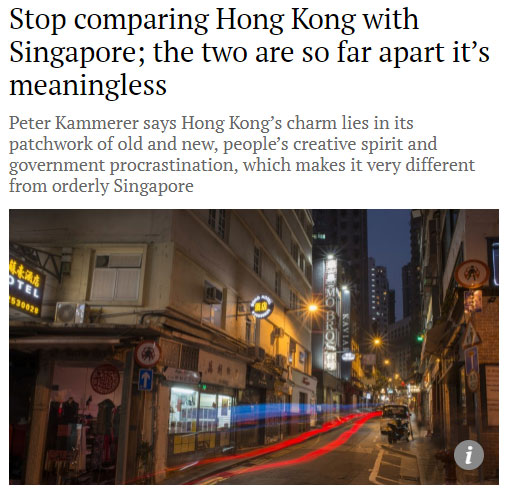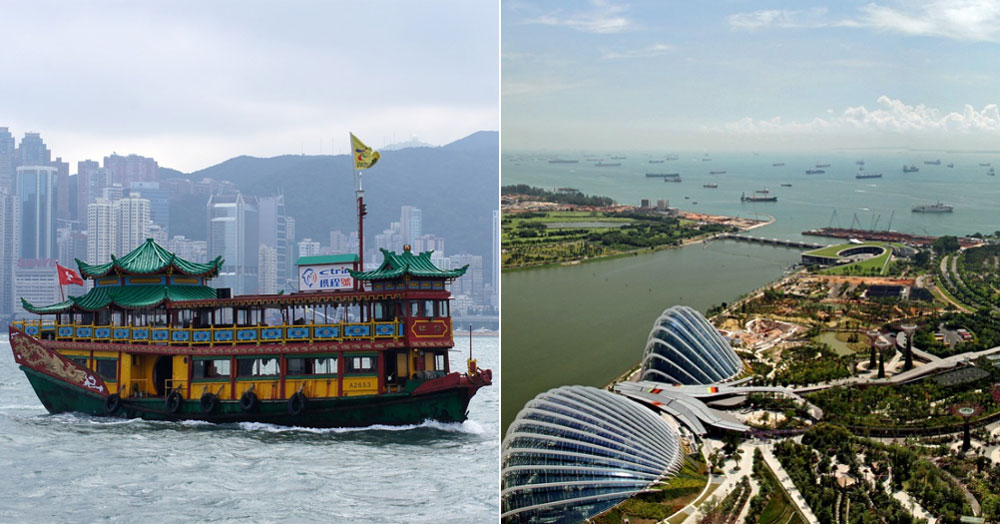Hong Kong's English newspaper of record, South China Morning Post, published an opinion piece on March 26, 2018, by its senior writer, Peter Kammerer on the hackneyed topic of SG vs HK.
 Article can be found here
Article can be found here
He wrote that there is no need to compare Hong Kong to Singapore, a country which, by his own admission, he hasn't visited since the 1980s.
Despite this fact and even because of it, Kammerer said he prefers Hong Kong, where he is based.
He wrote: "Whatever the case, there’s no reason whatsoever for having an inferiority complex. Hands down, Hong Kong is the place to be."
What does he mean?
Kammerer's writing, fortunately, is of the navel-gazing variety (a.k.a. non-academic).
His thesis -- if there was one or a bit of it that was detectable -- is:
• he cannot stand how Singapore is overplanned,
• while Hong Kong's charm lies in its patchwork of old and new,
• and Hong Kong's ability to procrastinate despite being inanely wealthy to push through with projects
• only because Hong Kong cannot summon enough will to make changes,
• and still has to deal with and overcome an overbearing Beijing on a regular basis.
To give the piece a more charitable reading: Kammerer feels Hong Kong is more spontaneous and unpredictable, and its dynamism is derived from having to confront reconciling its past democratic ideals with an assertive China.
It speaks to how feisty Hong Kongers can be.
[related_story]
Which parts of the writing are loose?
The piece makes a lot of guilty by association kind of reasoning -- at Singapore's expense.
For example:
"... the city state (of Singapore) is the Chinese government’s model, both for its benign dictatorship and the way its run."
This just makes it appear that Singapore is more like Beijing, a country Hong Kong is trying to not become.
It is also presumptuous:
"Singaporeans have been brainwashed into thinking that their city is better and therefore don’t have reason to be envious."
That is not entirely true. Singaporeans look to Hong Kong's MTR and salivate in marvel.
And Kammerer doesn't acknowledge the fullness of his shortcoming, even though he mentions it:
"I have to preface that by saying I’ve not been to Singapore for a long time; so long that I’m struggling to come up with even the year. I can say, though, that I went for a job interview there in 1987 and was offered the position, but decided against it."
Just because he has been here once, doesn't mean he has a qualified opinion of Singapore.
So, what's the point?
The point of the piece probably makes sense if you read it as a native Hong Konger.
This is for someone who currently feels trapped by circumstances not by his or her own making, and is powerless in the face of momentous change in this lifetime that one does not necessarily want or agree with (read: China's dominance and steamrolling abilities).
With this background in mind, then there is cold comfort in reading these two paragraphs Kammerer wrote, which summarises the piece:
Hong Kong remains a patchwork of the old and new, shops and neighbours coming and going due to rent contracts, and attempts to dramatically change the fabric met with an outcry that more often than not succeeds. If Beijing makes demands, the government complies swiftly, but home-grown ideas take time to gestate and sometimes never happen; we still don’t have household rubbish recycling, clean air, fleets of electric buses, vehicle congestion charges, a museum commemorating the life of Bruce Lee, and so on. There’s a certain charm in the procrastination, a sense that even though with our trillions in reserves, we can have whatever we want, but delivering it is such an effort that we’d rather not. Shining through is creativity, shown through artistic endeavour and innovative ways to get around problems.
[...]
Singapore does not have the “one country, two systems” model to worry about and have Beijing staring it in the face. Its leaders can formulate well-rounded policies and promptly push ahead with their implementation. They don’t have pro-Beijing interests to deal with and cross-border projects that have to be invested in. That doesn’t mean Hong Kong is better or worse – its circumstances are so different that comparison is wrong.
In other words, the intended audience of this piece is not Singaporeans.
It is for those who are sticking it out in Hong Kong.
By choice or otherwise.
Practical knowledge for everyone:
? Know how to beat terrorists in S'pore
? Media freelancers in S'pore ought to be paid within 45 days of submitting their invoices
If you like what you read, follow us on Facebook, Instagram, Twitter and Telegram to get the latest updates.
